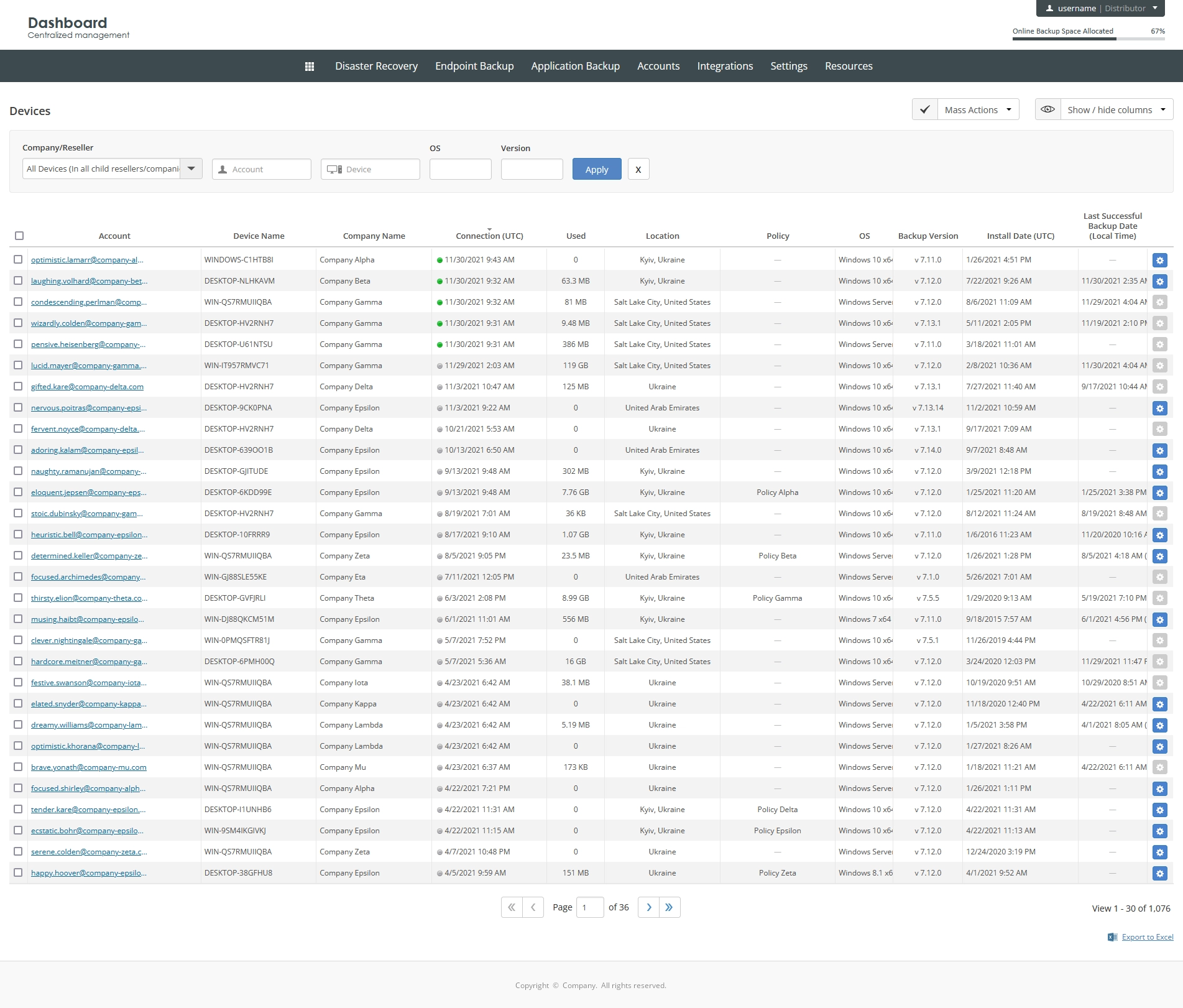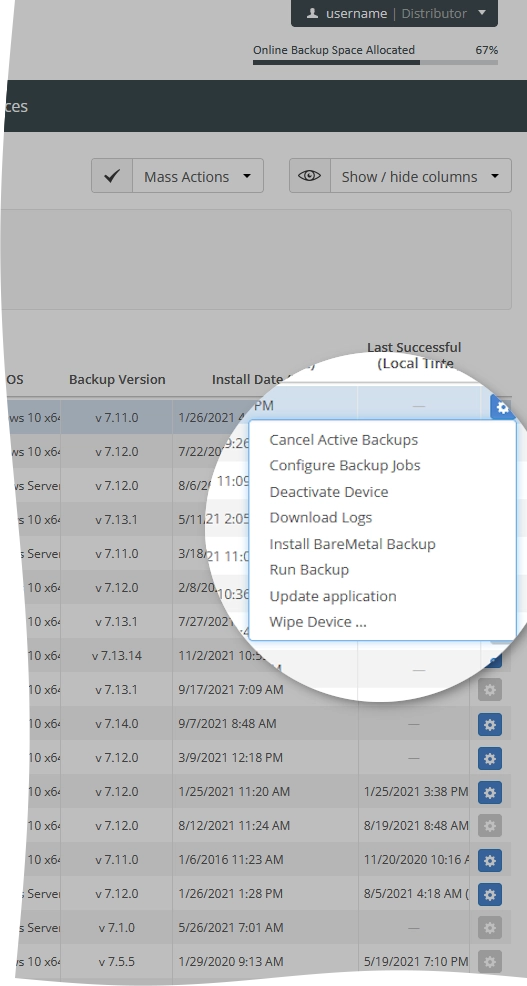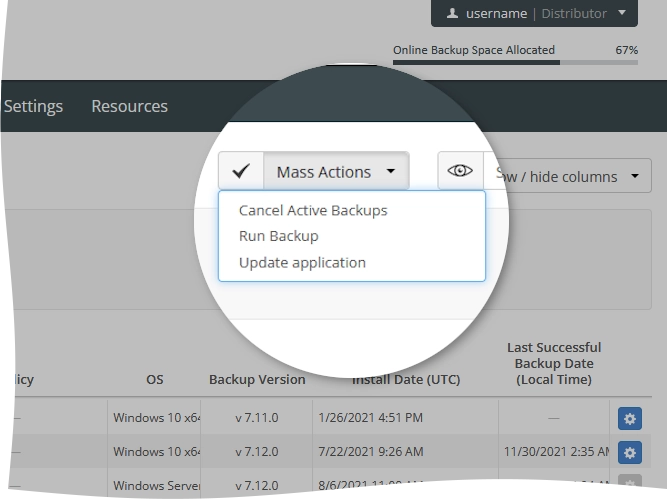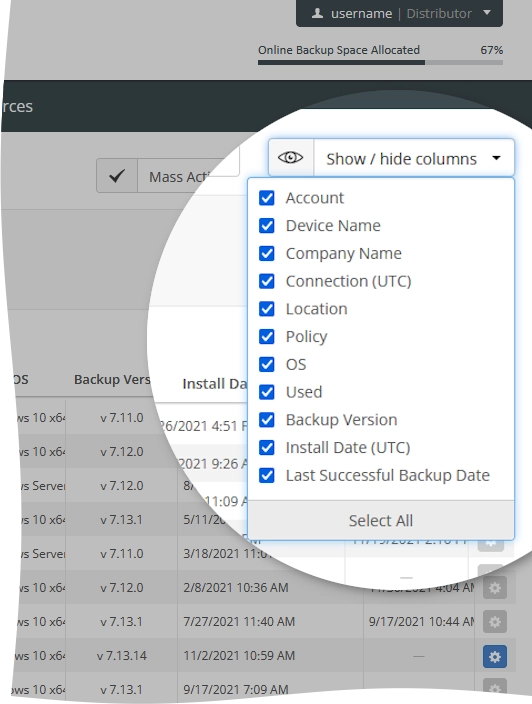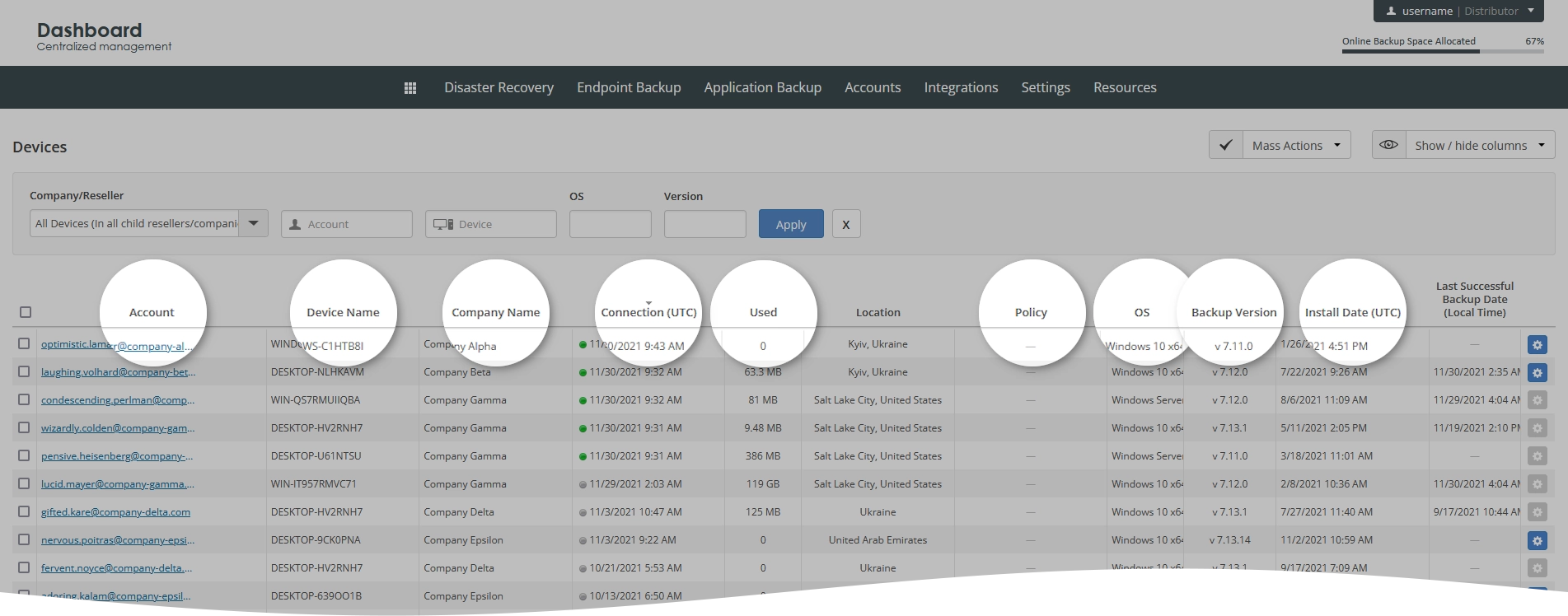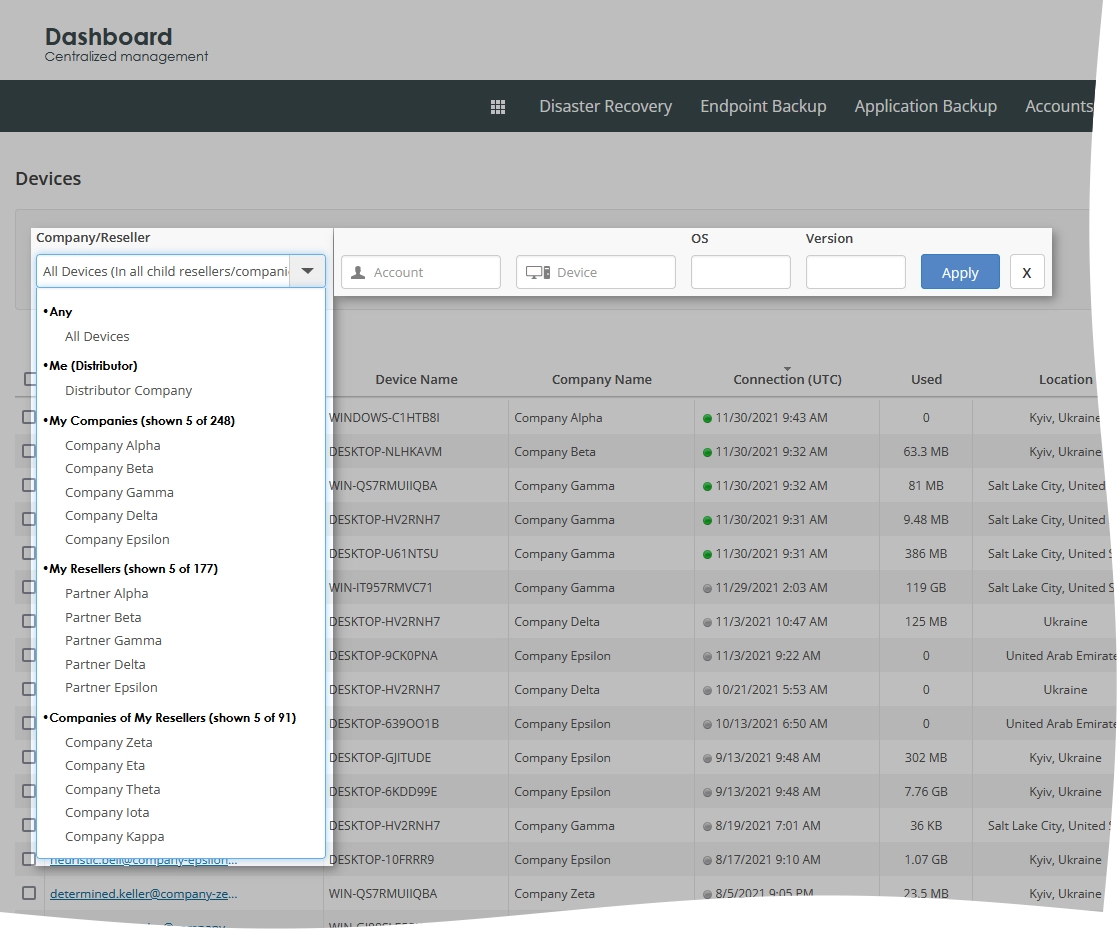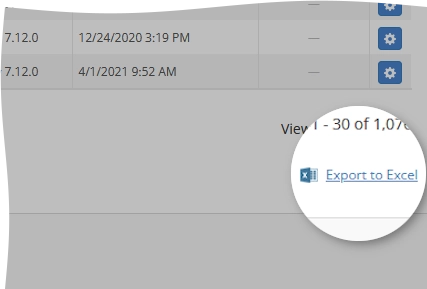View information about protected devices in the Dashboard
Overview
To view and manage protected devices:
Sign in to your account in the Dashboard.
Go to Endpoint Backup › Protected Devices.
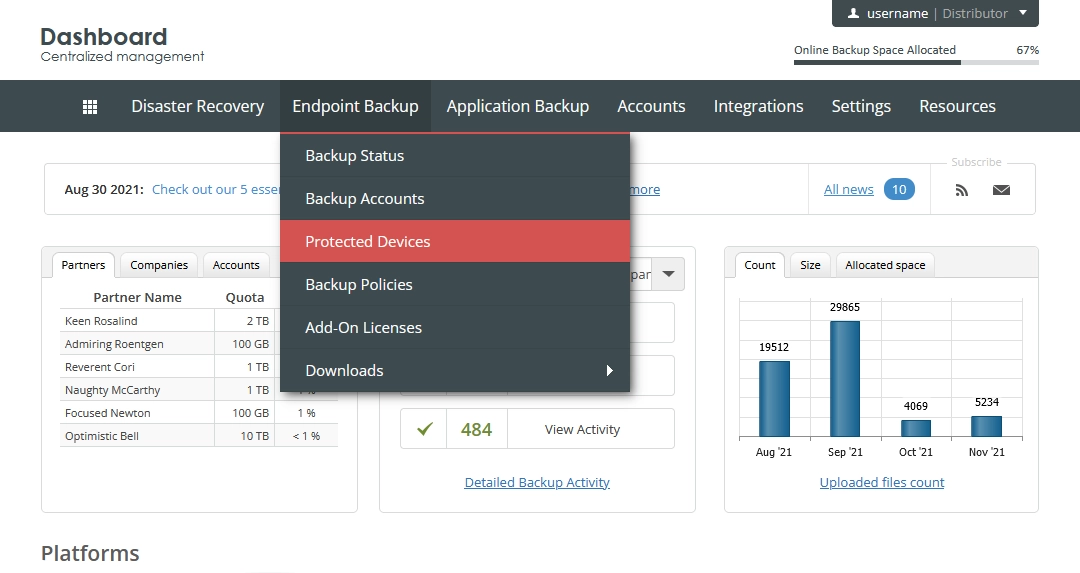
The consolidated protected devices page opens.
Information on the page is presented in the table format with the following columns:
| Column | Description | Note |
|---|---|---|
| Account | Name of the backup account the protected device is associated with | |
| Device Name | Name of the protected device | |
| Company Name | Name of the company the backup account belongs to | Hidden by default |
| Connection | Time and date (in UTC) when the protected device connected to the system last | |
| Used | Amount of space in the Infrascale cloud used by the backup data from the protected device | |
| Location | Last known location of the protected device | |
| Policy | Name of the backup and retention policy applied to the protected device | |
| OS | Operating system running on the protected device | |
| Backup Version | Version of Online Backup and Recovery Manager (OBRM) installed on the protected device | |
| Install Date | Time and date (in UTC) when OBRM was installed on the protected device | |
| Last Successful Backup Date | Time and date of the last know successful backup performed on the protected device |
Individual actions
You can take remote actions on individual protected devices shown on the page. For this, click Actions () in the last column against a protected device record, and then click the desired action to take.
Individual actions are available and active depending on the connection status (online or offline) of the protected device, and on the operating system the protected device is running. See the Notes column below.
| Action | Description | Notes |
|---|---|---|
| Cancel Active Backups | Stop running backups on the protected device | Available for the protected devices running Windows that are online |
| Configure Backup Jobs | Configure file and folder backup, and advanced folder backup on the protected device | Available for the protected devices running Windows that are either online or offline |
| Deactivate Device | Remove backup jobs on the protected device, cancel all licenses for the protected device, and remove the protected device from the system | Available for the protected devices running Windows, macOS, Android, or iOS that are either online or offline |
| Download Logs | Download a .zip archive with full logs of OBRM installed on the protected device | Available for the protected devices running Windows that are online |
| Install BareMetal Backup | Install ShadowProtect v5 on the protected device for bare-metal backup | Available for the protected devices running Windows that are online |
| Run Backup | Start backup on the protected device | Available for the protected devices running Windows that are online |
| Update application | Update OBRM installed on the protected device to the latest version, if any | Available for the protected devices running Windows that are online |
| Wipe Device | Delete files that are currently selected for backup from the protected device, or delete all user and system files from the device and mark it unusable | Available for the protected devices running Windows that are online |
Mass actions
You can take remote actions on multiple protected devices shown on the page at once. For this, select the protected devices to take a mass action on, click Mass Actions on the upper right, and then click the desired action.
Mass actions are available and active depending on the connection status (online or offline) of the protected device, and on the operating system the protected device is running. See the Notes column below.
| Action | Description | Notes |
|---|---|---|
| Cancel Active Backups | Stop running backups on the selected protected devices | Available for the protected devices running Windows that are online |
| Run Backup | Start backup on the selected protected devices | Available for the protected devices running Windows that are online |
| Update application | Update OBRM installed on the selected protected devices to the latest version, if any | Available for the protected devices running Windows that are online |
Navigate
By default, the system shows 30 protected device records in the table per page. To browse over protected devices, use the navigation buttons at the bottom of the page. Also, you can enter a number in the box, and then press Enter to go to the respective page.
| Name | Icon | Description |
|---|---|---|
| Next | Go to the next page | |
| Previous | Go to the previous page | |
| Last | Go to the last page | |
| First | Go to the first page |
Show or hide data
You can select what data to show on the page. For this, click Show / hide columns on the upper right, and then select or clear the columns you want to show or hide.
Sort data
You can sort protected devices in the table in ascending or descending order by:
name of the backup account the protected device is associated with (Account),
name of the protected device (Device Name),
name of the company the backup account belongs to (Company Name),
time and date (in UTC) when the protected device connected to the system last (Connection),
amount of space in the Infrascale cloud used by the backup data from the protected device (Used),
name of the backup policy applied to the protected device (Policy),
operating system running on the protected device (OS),
version of OBRM installed on the protected device (Backup Version), or
time and date (in UTC) when OBRM was installed on the protected device (Install Date).
For this, click the name of the corresponding column.
Filter data
You can filter protected devices in the table by:
partner (Company/Reseller, for distributors only),
company (Company/Reseller, for distributors and partners),
backup account (Account),
name of the protected device (Device),
name of the backup and retention policy applied to the protected device (Policy),
operating system running on the protected device (OS), and
version of OBRM installed on the protected device (Version).
For this, set the desired filters on the toolbar, and then click Apply.
To reset all filters at once, click Clear () next to the filters on the toolbar.
Export data
You can export all data (in all visible and hidden columns) regarding the protected devices shown in the table to an XLS spreadsheet. For this, click Export to Excel on the lower right, and then save the file with the exported data to the desired location.

